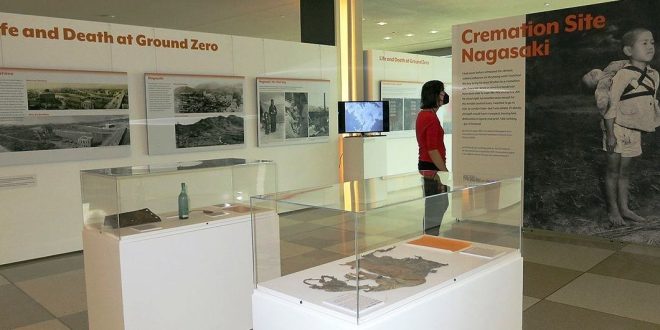
UNITED NATIONS, Aug 01 (IPS) – The upcoming 79th anniversary of the atomic bombings of Hiroshima and Nagasaki, which took place on August 6 and 9, 1945, remains a grim reminder of the destructive consequences of nuclear weapons.
The US bombings killed an estimated 90,000 to 210,000, with roughly half of the deaths occurring on the first day in Hiroshima.
But despite an intense global campaign for nuclear disarmament, the world has witnessed an increase in the number of nuclear powers from five—the US, UK, France, China and Russia—to nine, including India, Pakistan, North Korea and Israel.
Is the continued worldwide anti-nuclear campaign an exercise in futility? And will the rising trend continue—with countries such as Iran, Egypt, Saudi Arabia and South Korea—as potential nuclear powers of the future?
South Africa is the only country that has voluntarily given up nuclear weapons after developing them. In the 1980s, South Africa produced six nuclear weapons, but dismantled them between 1989 and 1993. A number of factors may have influenced South Africa’s decision, including national security, international relations, and a desire to avoid becoming a pariah state.
But there is an equally valid argument that there have been no nuclear wars—only threats—largely because of the success of the world-wide anti-nuclear campaign, the role of the United Nations and the collective action by most of the 193 member states in adopting several anti-nuclear treaties.
According to the UN Office for Disarmament Affairs (UNODA), the United Nations has sought to eliminate weapons of mass destruction (WMDs) ever since the establishment of the world body. The first resolution adopted by the UN General Assembly in 1946 established a commission to deal with problems related to the discovery of atomic energy, among others.
The commission was to make proposals for, inter alia, the control of atomic energy to the extent necessary to ensure its use only for peaceful purposes.
Several multilateral treaties have since been established with the aim of preventing nuclear proliferation and testing, while promoting progress in nuclear disarmament.
These include the Treaty on the Non-Proliferation of Nuclear Weapons (NPT), the Treaty Banning Nuclear Weapon Tests in the Atmosphere, in Outer Space and Under Water, also known as the Comprehensive Nuclear-Test-Ban Treaty (CTBT), which was signed in 1996 but has yet to enter into force, and the Treaty on the Prohibition of Nuclear Weapons (TPNW).
Jackie Cabasso, Executive Director, Western States Legal Foundation in Oakland, California, which monitors and analyzes US nuclear weapons programs and policies, told IPS: “As we approach the 79th anniversary of the U.S. atomic bombings of Hiroshima and Nagasaki, the world is facing a greater danger of nuclear war than at any time since 1945.”
“The terrifying doctrine of “nuclear deterrence,” which should long ago have been delegitimized and relegated to the dustbin of history and replaced with multilateral, non-militarized common security, has metastasized into a pathological ideology brandished by nuclear-armed states and their allies to justify the perpetual possession and threatened use—including first use—of nuclear weapons,” she pointed out.
“It is more important than ever that we heed the warnings of the aging hibakusha (A-bomb survivors): What happened to us must never be allowed to happen to anyone again; nuclear weapons and human beings cannot co-exist; no more Hiroshimas, no more Nagasakis!”
This demands an irreversible process of nuclear disarmament. But to the contrary, all nuclear armed states are qualitatively and, in some cases, quantitatively upgrading their nuclear arsenals and a new multipolar arms race is underway, she noted.
“To achieve the elimination of nuclear weapons and a global society that is more fair, peaceful, and ecologically sustainable, we will need to move from the irrational fear-based ideology of deterrence to the rational fear of an eventual nuclear weapon use, whether by accident, miscalculation, or design.”
“We will also need to stimulate a rational hope that security can be redefined in humanitarian and ecologically sustainable terms that will lead to the elimination of nuclear weapons and dramatic demilitarization, freeing up tremendous resources desperately needed to address universal human needs and protect the environment.”
In this time of multiple global crises, “our work for the elimination of nuclear weapons must take place in a much broader framework, taking into account the interface between nuclear and conventional weapons and militarism in general, the humanitarian and long-term environmental consequences of nuclear war, and the fundamental incompatibility of nuclear weapons with democracy, the rule of law, and human wellbeing,” declared Cabasso.
Dr. M.V. Ramana, Professor and Simons Chair in Disarmament, Global and Human Security School of Public Policy and Global Affairs and Graduate Program Director, MPPGA at the University of British Columbia, Vancouver, told IPS, “The glass is half-full or half-empty depending on how one looks at it.”
“The fact that we have avoided nuclear war since 1945 is also partly due to the persistence of the anti-nuclear movement. Historians like Lawrence Wittner have pointed to the many instances when governments have chosen nuclear restraint instead of unrestrained expansion.”
While South Africa is the only country that dismantled its entire nuclear weapons program, many countries—Sweden, for example—have chosen not to develop nuclear weapons even though they had the technical capacity to do so. They did so in part because of strong public opposition to nuclear weapons, which in turn is due to social movements supporting nuclear disarmament, he pointed out.
Thus, organizing for nuclear disarmament is not futile. Especially as we move into another era of conflicts between major powers, such movements will be critical to our survival, declared Ramana.
According to the UN, a group of elderly hibakusha, called Nihon Hidankyo, have dedicated their lives to achieving a non-proliferation treaty, which they hope will ultimately lead to a total ban on nuclear weapons.
“On an overcrowded train on the Hakushima line, I fainted for a while, holding in my arms my eldest daughter of one year and six months. I regained my senses at her cries and found no one else was on the train,” a 34-year-old woman testifies in the booklet. She was located just two kilometres from the Hiroshima epicenter.
Fleeing to her relatives in Hesaka, at age 24, another woman remembers that “people, with the skin dangling down, were stumbling along. They fell down with a thud and died one after another,” adding, “still now I often have nightmares about this, and people say, ‘it’s neurosis’.”
One man who entered Hiroshima after the bomb recalled in the exhibition “that dreadful scene—I cannot forget even after many decades.”

A woman who was 25 years old at the time said, “When I went outside, it was dark as night. Then it got brighter and brighter, and I could see burnt people crying and running about in utter confusion. It was hell…I found my neighbor trapped under a fallen concrete wall… Only half of his face was showing. He was burned alive”.
The steadfast conviction of the Hidankyo remains: “Nuclear weapons are absolute evil that cannot coexist with humans. There is no choice but to abolish them.”
Addressing the UN Security Council last March, Secretary-General Antonio Guterres warned that with geopolitical tensions escalating the risk of nuclear warfare to its highest point in decades, reducing and abolishing nuclear weapons is the only viable path to saving humanity.
“There is one path—and one path only—that will vanquish this senseless and suicidal shadow once and for all. We need disarmament now,” he said, urging nuclear-weapon States to re-engage to prevent any use of a nuclear weapon, re-affirm moratoria on nuclear testing and “urgently agree that none of them will be the first to use nuclear weapons.”
He called for reductions in the number of nuclear weapons led by the holders of the largest arsenals—the United States and the Russian Federation—to “find a way back to the negotiating table” to fully implement the New Measures for the Further Reduction and Limitation of Strategic Offensive Arms, or START Treaty, and agree on its successor.
“When each country pursues its own security without regard for others, we create global insecurity that threatens us all,” he observed. Almost eight decades after the incineration of Hiroshima and Nagasaki, nuclear weapons still represent a clear danger to global peace and security, growing in power, range and stealth.”
“States possessing them are absent from the negotiating table, and some statements have raised the prospect of unleashing nuclear hell—threats that we must all denounce with clarity and force,” he said. Moreover, emerging technologies such as artificial intelligence and cyber and outer space domains have created new risks.”
From Pope Francis, who calls the possession of nuclear arms “immoral”, to the hibakusha, the brave survivors of Hiroshima and Nagasaki, to Hollywood, where Oppenheimer brought the harsh reality of nuclear doomsday to vivid life for millions around the world, people are calling for an end to the nuclear madness. “Humanity cannot survive a sequel to Oppenheimer,” he warned.
When Nagasaki marked the 78th anniversary of the U.S. atomic bombing of the city last year, the mayor Shiro Suzuki, urged world powers to abolish nuclear weapons, saying nuclear deterrence also increases risks of nuclear war, according to an Associated Press (AP) report.
He called on the Group of Seven (G7) industrial powers to adopt a separate document on nuclear disarmament that called for using nuclear weapons as deterrence.
“Now is the time to show courage and make the decision to break free from dependence on nuclear deterrence,” Suzuki said in his peace declaration. “As long as states are dependent on nuclear deterrence, we cannot realize a world without nuclear weapons.”
Russia’s nuclear threat has encouraged other nuclear states to accelerate their dependence on nuclear weapons or enhance capabilities, further increasing the risk of nuclear war, and that Russia is not the only one representing the risk of nuclear deterrence, Suzuki said.
Suzuki, whose parents were hibakusha, or survivors of the Nagasaki attack, said knowing the reality of the atomic bombings is the starting point for achieving a world without nuclear weapons. He said the survivors’ testimonies are a true deterrent against nuclear weapons use, the AP report said.
This article is brought to you by IPS Noram, in collaboration with INPS Japan and Soka Gakkai International, in consultative status with UN ECOSOC.
IPS UN Bureau Report
Follow @IPSNewsUNBureau
Follow IPS News UN Bureau on Instagram
© Inter Press Service (2024) — All Rights ReservedOriginal source: Inter Press Service
 Top Naija News – Nigeria News, Nigerian News & Top Stories Top Naija News – Nigerian Newspapers, Nigerian News. topnaijanews is a daily Nigerian newspaper covering Latest News, Breaking News, Entertainment, Sports, Lifestyle and Politics.
Top Naija News – Nigeria News, Nigerian News & Top Stories Top Naija News – Nigerian Newspapers, Nigerian News. topnaijanews is a daily Nigerian newspaper covering Latest News, Breaking News, Entertainment, Sports, Lifestyle and Politics.




